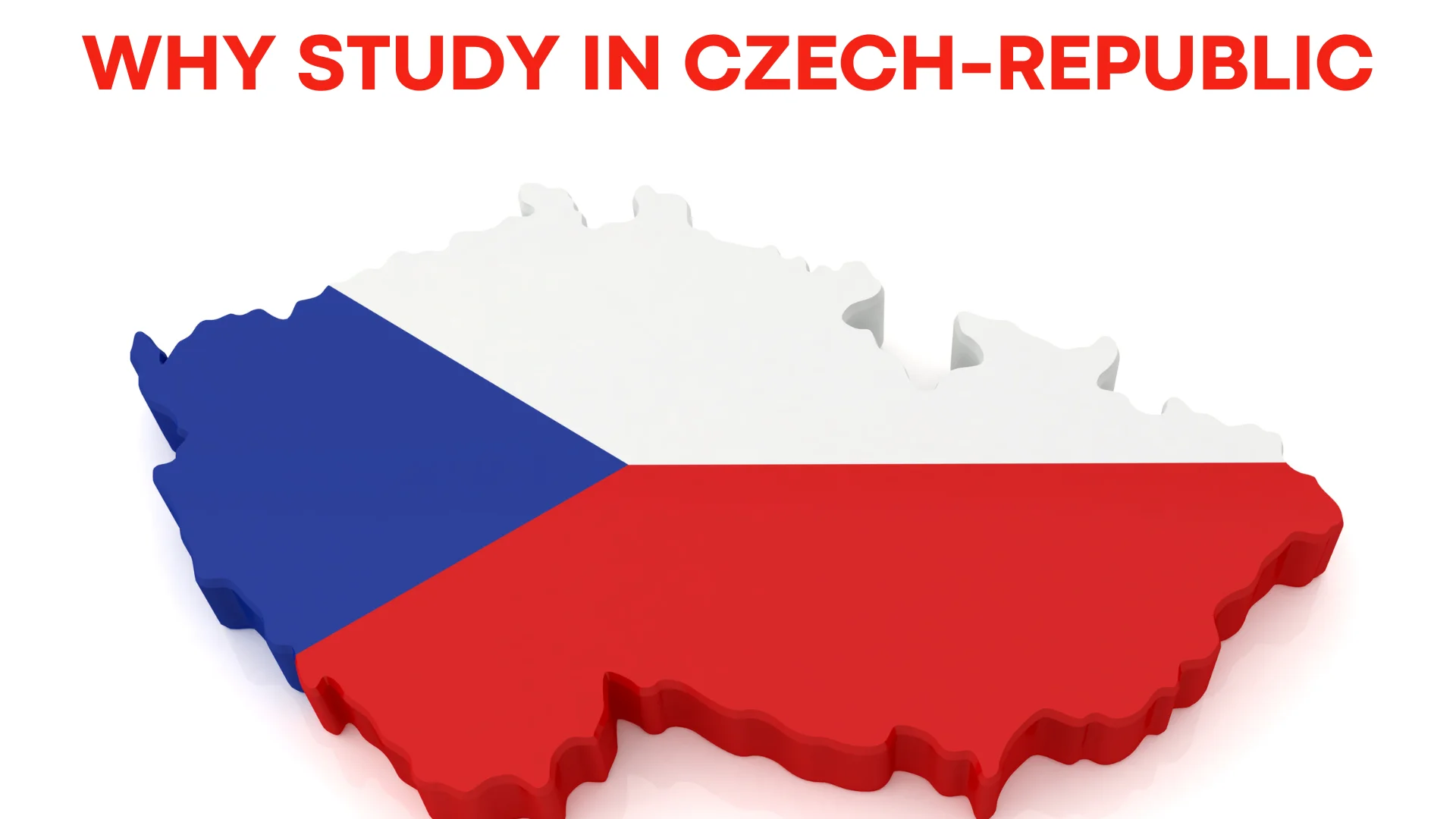Study in Czech Republic
Take the first step towards your journey of studying in Denmark. We have experts to help you reach your destination. Leave your questions here!
Why Share Your Number?
Providing your contact number allows our team to connect with you directly, offering personalized guidance tailored to your needs. Whether you're exploring visa options, academic opportunities, or migration pathways, our consultants ensure you receive:
- Instant Assistance: Get real-time support from our experienced advisors.
- Exclusive Updates: Receive notifications about visa updates, deadlines, and special offers.
- Tailored Solutions: Get recommendations customized to your goals and profile.

Study In Czech Republic
The growing number of students pursuing their education is indicative of their interest in doing so. Europe is a stunning continent that's widely regarded as the best place to pursue your career goals. There are numerous developed nations on the continent, which presents challenges for students. Students who are interested in studying abroad in the Czech Republic should bookmark this page, as it contains several compelling arguments for doing so. It will help you become interested if you know a little about the country. Now let's get going.
1. Czech Republic: A New Nation Distinguished by Its Unspoiled Beauty Learning in the Czech Republic places you at the forefront of excellent research and education, particularly in the fields of engineering, medicine, and science. These illustrious histories of high-quality education inspire students to apply for a student visa to the Czech Republic. It is also well-known for its spas, castles, and immaculate scenery, which yet retains a hint of its medieval charm.
The country known as Czechia, or the Czech Republic, is situated in central Europe. It shares borders with Slovakia to the east, Germany to the west, Austria to the south, and Poland to the northeast. Czech Republic is home to 10.5 million people and has a land area of 78,866 square kilometers. With 1.2 million residents, Prague is the nation's capital and largest city. The economy of the Czech Republic is well developed and has a high per capita income. Since May 2014, the nation has been a part of the Schengen area after border controls were eliminated. Thus, you need to be aware of a few things before submitting an application for a Czech Republic Schengen Visa.
2. Language-Savvy People: We all know that Dutch is the preferred language in the Netherlands, but do you know that Dutch and English are similar? Yes, It is easier for English-speaking people to learn Dutch than French and Italian.
3. High-quality education: Dutch universities are known for their high-quality education and innovative teaching methods. Dutch universities have a strong student association tradition, which organizes various activities and events, such as parties, sports tournaments, and cultural events. Joining a student association is a great way to meet new people and get involved in campus life.
4. Multicultural and International environment: The Netherlands is diverse, and its universities reflect this diversity. You will have the opportunity to study and interact with people worldwide, which can broaden your perspective and enhance your cultural awareness. The country is a leader in renewable energy, and its citizens are conscious of their carbon footprint.
5. Affordable fees: The Netherlands has relatively low tuition fees compared to European countries. Additionally, scholarships and grants are available for international students to help cover the costs of tuition and living expenses.
6. English proficiency: The Dutch are known for their fluency in English, which makes it easy, convenient, and pleasant for international students to integrate into society and feel at home.
7. Living expenses in the budget: The Netherlands is one of the best countries to live in at a low cost. As a student, you will get huge discounts at museums, restaurants, and bars. Also, some online applications will help you find inexpensive living locations. The Dutch are known for their commitment to sustainability and the environment.
8. Excellent Accessibility to Travel: It is centrally located in Europe and is often called a gateway of Europe. The transportation system of the Netherlands is developed and connected very well. Also, students avail offers and discounts to explore the cities. Furthermore, there are dedicated roads to travel to other unique towns. Also, The Netherlands is famous for its biking culture, and its citizens use bicycles as a primary mode of transportation. It not only promotes a healthy lifestyle but also helps to reduce traffic congestion and air pollution.
9. Job opportunities: The Netherlands has a strong economy and is home to many international companies, making it a great place to start a career after graduation. The Dutch government also offers a post-study work visa, which allows graduates to stay in the country for some time to find work.
10. Innovative and forward-thinking society: The Netherlands is known for its innovative and progressive community, and its universities reflect this. Students are encouraged to think critically and creatively and to develop new and innovative ideas. The Netherlands is a country that values innovation, diversity, and sustainability, and its citizens are known for their open-mindedness, creativity, and commitment to improving the world around them.

Do you have dreams of completing your degree abroad? Students might think about studying in a strategically positioned European country with a fascinating history, breathtaking scenery and architecture, a more affordable cost of living, and a long tradition of high-quality education. For all of these criteria, Indo-West advises taking the Czech Republic into account. Even though Czech is the official language of the nation and is what most universities and institutions encourage students to study, there are over 1000 English-based study programs that may be taken to get degrees in practically any field.
A methodical approach to obtaining a student VISA for the Czech Republic
Students who have made the decision to study in the Czech Republic need to be aware of the fundamental procedures. The many steps in the VISA application procedure are described by our Czech Republic VISA advisors. Let's go over them in more depth.
1. Students from non-EU/EEA nations are required to apply for a student visa and, in some cases, a residency permit for the Czech Republic. All you need to do is apply for a short-term visa (Visa C) if your study program is shorter than three months. To finish your studies, you must apply for both a long-term residence permit and a long-term visa (Visa D) if you plan to stay in the nation for longer than ninety days. 2. EU/EEA and Swiss nationals can live and study in the Czech Republic without a student visa or residence permit. You'll need to report to the foreign police department within three days if you plan on staying longer than 30 days. 3. Applying for visas and residence permits can take 2 to 3 months because many documents need to be converted into Czech. There is an administration fee of 250 CZK (€100/ $110) for each application that every student needs to pay.
Students who want to study in the country for a long time must apply for a long-term VISA. Here are steps:
1. Reserve a seat at the Czech institution of your choice: In order to guarantee a spot at the
university of their choice, students must apply for an offer letter. The education authority
sends you a formal admissions letter after you apply and provide the necessary paperwork, and you
must pay any enrollment costs to reserve your spot.
2. Schedule a VISA appointment at the Czech embassy or consulate in your area: Since appointments
fill up quickly, it is imperative that you make the appointment with the embassy as soon as
possible.
3. Complete the application for a student visa to the Czech Republic. Fill out every section
precisely, and don't forget to sign the page before turning it in.
4. Assemble the necessary paperwork: A number of documents must be sent with your application.
Later, a comprehensive list is supplied.
5. Attend your appointment: Ensure you carry all the requested information so the embassy can
accept your application.
6. Pay the administrative fee: Students must also pay the application fees before sending it to
the corresponding authority.
7. Decision making: Visa processing time, taken by the embassy, changes depending on the
complexity of the application, but students get the response within 120 days.
8. Apply for a residence permit: Once your visa is approved, you can begin the residence permit
application process. You must schedule another date with your nearby Czech embassy or consulate.
Required Documents
1. Your institution's letter of enrollment
2. A statement of purpose (SOP) outlining your goals for visiting the Czech Republic
3. A current passport that is good for more than a year
4. Two passport-style images
5. Details of the accommodations
6. Information regarding your international health insurance policy (HIS; minimum coverage of
€30,000)
7. Report on criminal records
Bring your loved ones to the nation
1. Your relatives may apply for a long-term family reunification visa and a residence permit if
they wish to come live with you in the Czech Republic. Every family member should file a separate
visa application through the Czech embassy in their home nation.
2. You may apply for both the visa and the residency permit at the same time, together with your
family members. However, we advise waiting to apply for your member's VISA until your paperwork
have been granted by the embassy.
Using My Student VISA for the Czech Republic Correctly
Your work hours can be limited to 20 per week if you are granted a Czech student visa, but you
can still work in addition to your studies. It's to make sure you give your academics adequate
attention.
It is not necessary for you to apply for a separate work permit because this ability to work is
granted automatically as part of the approval of your visa. Your employer will report your
employment to the Public Employment Service
Using My Student VISA for the Czech Republic Correctly
1. In the event that your application for a student visa to the Czech Republic is denied, the consular office
will send you a refusal letter outlining the rationale for the decision. It's depressing, but you don't have
to give up.
2. If your initial application for a visa was denied due to noncompliance with the requirements or
nonsubmission of required evidence, you have the option to resubmit. However, you have to have addressed the
issues with your previous application; if not, you will undoubtedly receive another rejection.
3. Within 15 days, you have the option to raise a plea if you believe your application was unfairly or
incorrectly denied. Your appeal letter needs to be detailed and make a strong case for being given another
look.
4. To file an appeal, you must pay a cost of 60 EUR.
